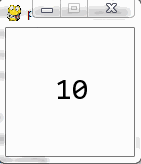I started using pygame and I want to do simple game. One of the elements which I need is countdown timer. How can I do the countdown time (eg 10 seconds) in PyGame?
Countdown timer in Pygame
87.9k views Asked by adamo94 AtThere are 8 answers
 On
On
There are several ways you can do this- here's one. Python doesn't have a mechanism for interrupts as far as I know.
import time, datetime
timer_stop = datetime.datetime.utcnow() +datetime.timedelta(seconds=10)
while True:
if datetime.datetime.utcnow() > timer_stop:
print "timer complete"
break
 On
On
Another easy way is to simply use pygame's event system.
Here's a simple example:
import pygame
pygame.init()
screen = pygame.display.set_mode((128, 128))
clock = pygame.time.Clock()
counter, text = 10, '10'.rjust(3)
pygame.time.set_timer(pygame.USEREVENT, 1000)
font = pygame.font.SysFont('Consolas', 30)
run = True
while run:
for e in pygame.event.get():
if e.type == pygame.USEREVENT:
counter -= 1
text = str(counter).rjust(3) if counter > 0 else 'boom!'
if e.type == pygame.QUIT:
run = False
screen.fill((255, 255, 255))
screen.blit(font.render(text, True, (0, 0, 0)), (32, 48))
pygame.display.flip()
clock.tick(60)

 On
On
pygame.time.Clock.tick returns the time in milliseconds since the last clock.tick call (delta time, dt), so you can use it to increase or decrease a timer variable.
import pygame as pg
def main():
pg.init()
screen = pg.display.set_mode((640, 480))
font = pg.font.Font(None, 40)
gray = pg.Color('gray19')
blue = pg.Color('dodgerblue')
# The clock is used to limit the frame rate
# and returns the time since last tick.
clock = pg.time.Clock()
timer = 10 # Decrease this to count down.
dt = 0 # Delta time (time since last tick).
done = False
while not done:
for event in pg.event.get():
if event.type == pg.QUIT:
done = True
timer -= dt
if timer <= 0:
timer = 10 # Reset it to 10 or do something else.
screen.fill(gray)
txt = font.render(str(round(timer, 2)), True, blue)
screen.blit(txt, (70, 70))
pg.display.flip()
dt = clock.tick(30) / 1000 # / 1000 to convert to seconds.
if __name__ == '__main__':
main()
pg.quit()
 On
On
There are many ways to do this and it is one of them
import pygame,time, sys
from pygame.locals import*
pygame.init()
screen_size = (400,400)
screen = pygame.display.set_mode(screen_size)
pygame.display.set_caption("timer")
time_left = 90 #duration of the timer in seconds
crashed = False
font = pygame.font.SysFont("Somic Sans MS", 30)
color = (255, 255, 255)
while not crashed:
for event in pygame.event.get():
if event.type == QUIT:
crashed = True
total_mins = time_left//60 # minutes left
total_sec = time_left-(60*(total_mins)) #seconds left
time_left -= 1
if time_left > -1:
text = font.render(("Time left: "+str(total_mins)+":"+str(total_sec)), True, color)
screen.blit(text, (200, 200))
pygame.display.flip()
screen.fill((20,20,20))
time.sleep(1)#making the time interval of the loop 1sec
else:
text = font.render("Time Over!!", True, color)
screen.blit(text, (200, 200))
pygame.display.flip()
screen.fill((20,20,20))
pygame.quit()
sys.exit()
 On
On
In pygame exists a timer event. Use pygame.time.set_timer() to repeatedly create an USEREVENT. e.g.:
timer_interval = 500 # 0.5 seconds
timer_event = pygame.USEREVENT + 1
pygame.time.set_timer(timer_event , timer_interval)
Note, in pygame customer events can be defined. Each event needs a unique id. The ids for the user events have to be between pygame.USEREVENT (24) and pygame.NUMEVENTS (32). In this case pygame.USEREVENT+1 is the event id for the timer event.
To disable the timer for an event, set the milliseconds argument to 0.
Receive the event in the event loop:
running = True
while running:
for event in pygame.event.get():
if event.type == pygame.QUIT:
running = False
elif event.type == timer_event:
# [...]
The timer event can be stopped by passing 0 to the time parameter.
See the example:
import pygame
pygame.init()
window = pygame.display.set_mode((200, 200))
clock = pygame.time.Clock()
font = pygame.font.SysFont(None, 100)
counter = 10
text = font.render(str(counter), True, (0, 128, 0))
timer_event = pygame.USEREVENT+1
pygame.time.set_timer(timer_event, 1000)
run = True
while run:
clock.tick(60)
for event in pygame.event.get():
if event.type == pygame.QUIT:
run = False
elif event.type == timer_event:
counter -= 1
text = font.render(str(counter), True, (0, 128, 0))
if counter == 0:
pygame.time.set_timer(timer_event, 0)
window.fill((255, 255, 255))
text_rect = text.get_rect(center = window.get_rect().center)
window.blit(text, text_rect)
pygame.display.flip()
 On
On
Another way to do it is to set up a new USEREVENT for a tick, set the time interval for it, then put the event into your game loop '''
import pygame
from pygame.locals import *
import sys
pygame.init()
#just making a window to be easy to kill the program here
display = pygame.display.set_mode((300, 300))
pygame.display.set_caption("tick tock")
#set tick timer
tick = pygame.USEREVENT
pygame.time.set_timer(tick,1000)
while 1:
for event in pygame.event.get():
if event.type == QUIT:
pygame.quit()
sys.exit()
if event.type == pygame.USEREVENT:
if event.type == tick:
## do whatever you want when the tick happens
print('My tick happened')

On this page you will find what you are looking for http://www.pygame.org/docs/ref/time.html#pygame.time.get_ticks
You download ticks once before beginning the countdown (which can be a trigger in the game - the key event, whatever). For example: